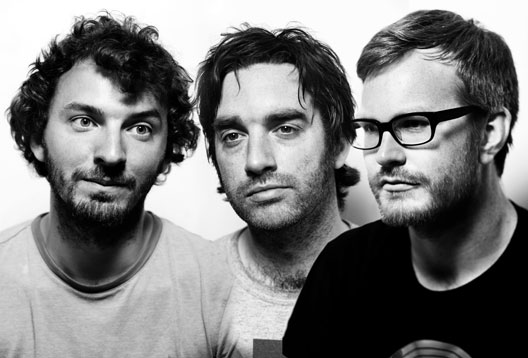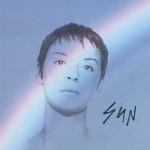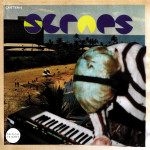An interview with Tom Rogerson and Matt Calvert.
What’s top of the agenda at the moment, the live show or new material?
Tom: We’re just about to stop focussing on the live show actually. We’ve been putting it off for a while now because we’ve all been doing our own things, but I think we’ve played enough festivals this summer that we’ve become tired of playing the same stuff, it’s still fun for us, but we’d like to have more to dive into.
Matt: Yeah I think by the close of 2011, playing a lot of songs for weeks on end in various places, it had definitely got to the point of thinking, ‘if we have to play any of these songs again, I’ll fucking kill myself’. But the release from earlier this year was a compilation of all our old E.P.s, and to celebrate that we did some gigs just playing that record through in chronological order, and even though we’d played all the tracks within our live set before, to do it like that almost felt like we’d never played it before, and instantly freshened it up.
Tom: … But yes, you may be disappointed to hear that none of the material we released this year was new material, just to clarify! Writing new material is a long, drawn out process for us. There’s also extra pressure on this one because there is a sub-conscious awareness that there’s more expectation on this one because more people know about us, and also we’ve had some breaks this year that could really help us with this new album, and all of us are keen to develop the sound as well in some way. I also think in a band like ours where we’re already being experimental and pushing boundaries in some way, there becomes a pressure to carry on doing that.
Right, and as an instrumentally focussed band, how do you try to turn the page and do new things, is there still a conceptual idea to how you do that?
Tom: Yes, I’d say so, there are targets in mind, and an individual track, for example, could be trying to rip off a sound or track that we like, or it could be thinking ‘wouldn’t it be interesting if we tried to do something like this?’ So I think conceptualisation is always important, to discuss it between the three of us.
Have any particular ideas come to the fore, whether it be more electronic or more instrumental?
Tom: Right, well we had that with the last album as well (Route One or Die) and it went off in a completely different direction. So I think it’s important to have goals in mind, but as anyone will tell you, the second you begin that creative process, it goes off in a completely different direction.
Matt: There’s also now this big expectation for us to be this big live powerhouse, especially with Betts with us. I think that was really in mind with the arrangement of the last record, we really took liberties with the production of that, because the more we played it, it just felt like a band playing in a room, so that’s what the album ended up sounding like. So I think if we then made an album that was really interesting sonically, and production wise, it might be a really rewarding headphone listen, but might not be the most spectacular thing to watch. So I guess now trying to go forward from here, what we think about is trying to break out of the fear of that I think.
Tom: That’s a really key point, because from the very first day the band was originally about being an amazing live project, and ripping off the warped style in a live context. To that extent it started as an exercise, ‘what would happen if you tried to do that live?’ From there it developed into something altogether different, but that’s been the guiding principle for so long even when we’ve tried to get away from it at certain points and develop the sound. Now that the first album is fully out, I think we’ve bought ourselves the space to now go further. I think an interesting area to explore would be to think, ‘well fine, let’s go away make a record as best we can, let’s not care about what it sounds live’, but then when you come to play the songs live, how do you then go about re-creating something live that sounds amazing, and I think that will be the key.
Matt: And feel amazing too, because you see so many people who are producers and they do a live set, which is basically a bit of a button bash, and it might sound great but it’s nothing to look at. So I think if we were to now set out to make a really production-y album where we do non-shreddy drums, and take out all the Guitar, will it still sound and feel like Three Trapped Tigers? And so how comfortable will we all feel with the end result?
Tom: Route One Or Die was completed 18 months ago, that’s a fuck of a long time to do nothing, we’ve written not a note of music in 18 months.
Matt: In all honesty, I haven’t actually given much thought to this next album because we’ve all been doing other things, and I’ve been thinking about doing a solo album. But I do feel it could probably sound however we want it to, and so when I have had passing thoughts about it, I’ve thought that well, even if we are still to include some ridiculous drum stuff for example, I think there’s ways that we can make it exist in a different context, to change the overall scope.
Have all of you guys always been on this end of the musical spectrum?
Matt: No. Not to sound full of it, but I think if you’re capable on an instrument then it means you can play a lot of different music if you want to, and I think we have all enjoyed playing loads of different music growing up. However not all of the music we play would be considered a representation of ourselves, so for example Tom has played with ‘Emmy the Great’, which is really different and whilst there is still definitely artistry in it, I don’t know if that’s what Tom would ever call his thing.
Did you still find it fulfilling?
Tom: Oh totally yeah, I loved it because it was all about playing in the fewest notes possible! But I also helped with the production and arrangement, and that’s kind of how I got started with all of this, because originally I was doing more jazz and classical stuff, and that’s how we all know each other really, is through the jazz scene in London, and I think actually if you know that it helps make the band make a bit more sense. And as we often used to say in the early days, the band is sort of in the intersection of a venn diagram of the three of us, Betts is far more into metal than Matt or I, Matt’s more into American Hard-Rock than me certainly, and I’m probably more into classical stuff, but that’s what’s cool about being in a band right? It’s not like we hate each other’s interests.
What’s interesting is that Matt has been doing solo stuff for ten years, some of which does sound like this, because him and Betts have been partners in crime for years, but he’s also working on some electronica right now, which is way more sound-design-y, may not have any Guitars, and has also done an acoustic project with 8 or 9 stringed instruments, and I would definitely do a piano record if I could find a way of doing it that made me happy. So I definitely don’t see Three Trapped Tigers as all we can do. I was thinking this the other day about Steve Reich, who at the age of 72, is still making minimalist music. That’s fine, you invented it, that’s your thing, but he’s stuck with it for 42 years now, and he can blatantly could sit down on a piano and play something else, it’s strange.
Matt: That’s the thing though, just because you can do something, doesn’t necessarily mean it’s what you want to present as yours. As a piss-take we play loads of ridiculous shit in rehearsals, we do it really tongue-in-cheek, and I do really enjoy playing certain other people’s music, but I don’t think it’s ever what I’d want to go down in the annals of time having done.
Tom: That’s true, and maybe you don’t want to present that but individually I do want to present quite a few different things.
Matt: I think, trying to wrap up that question, generally the things we have done have been at the more adventurous end of whatever it happens to be. Generally, it makes me writhe in awkwardness when this band gets described as ‘Math-Rock’ for example, it makes sense for us to be lumped under a large umbrella with a lot of those bands, but I feel like we are at another end of that. And then there’s another band I play in where I basically just use a laptop and then there’s some instruments that I live sample and process, and fundamentally it is influenced by Jazz. That band is called ma (http://soundcloud.com/ma-music).
If you were prime-minister for a day, what law would you repeal/enact?
Matt: You’re the more suitable candidate Tom, you being the political ignoramus… Here’s your soapbox Tom, let’s go!
Tom: That’s a crazy question, I don’t know, I could email you about that after a week or so maybe.
Matt: Tax laws Tom?
Tom: Yeah. Maybe the budget 2010, the budget 2011, the finance bill 2011, the coalition agreement? Oh, the Railway privatisation act, that’s a good one from 1994! I’d repeal that one. In terms of enacting one, God knows, I wouldn’t ever want to be in the position where I had to do that.
Matt: All I know is, you can’t please every one.
Tom: Ha, if Three Trapped Tigers has taught me anything, it’s that you can’t please everyone.
Are any of you religious?
Tom: I have a religious upbringing, but I wouldn’t say I believe in God. Though I was at a Christian wedding yesterday, and it’s great to sing, they’ve got the best hymns. I think the Church of England has a lot to answer for in the development of British rock music, there’s some powerful shit…. Sorry ‘there’s some powerful shit’ is going to look woeful in text.
Do you think it’s better to devote your life to one undivided cause or a thousand fleeting ideas?
Matt: I think you’ll never know until you progress through life itself, you might wake up one day and think ‘man, playing this fucking inward music is just the most wholly self-satisfying thing, and I’m actually going to start a charity, or teach, or go round the world, and live on an island in the Phillipines, or just find other causes.’ At the moment I don’t have any plans to do that.
Do any of you do other things, life things or artistically, outside music that you seek fulfilment in?
Tom: I do yeah, I used to write quite a bit, I did English at University. I’ve been involved politically with quite a lot of things, and that stuff I do enjoy because it gives you a better perspective on things. But I think for all of us, music was the thing we were always going to do.
Matt: For me, it was just that I wasn’t interested enough in anything else. There are other things I’m interested in and could become more interested in, History especially. But everything I do outside of music is on a purely hobby level, but find really satisfying, Cooking being an example of something that I could go really deep into, if I had the time and the inclination.
Tom: I think ultimately, it’s just obvious. I was discussing this last night with someone, I was at my cousin’s wedding, there were lots of posh middle-class people there, because that’s what my family is, and so many of them just look at you with astonishment that you’re a musician. They’re delighted to meet you, and so excited to talk to you.
Matt: That’s why Tom’s such a rebel! Some kind of left-wing artisan!
Tom: Yeah, it’s crazy! But I was being grilled by this lovely guy who was sixty and a GP from Cambridge, and he just couldn’t get his head round the fact that I didn’t have financial stability, or that I wasn’t earning over twenty grand a year or whatever, but I don’t see it as some lifestyle choice, this is just clearly what I was always going to do from as early as I can ever remember, the idea of not doing it is totally absurd. If I lost my hands, I really don’t know what I’d do.




